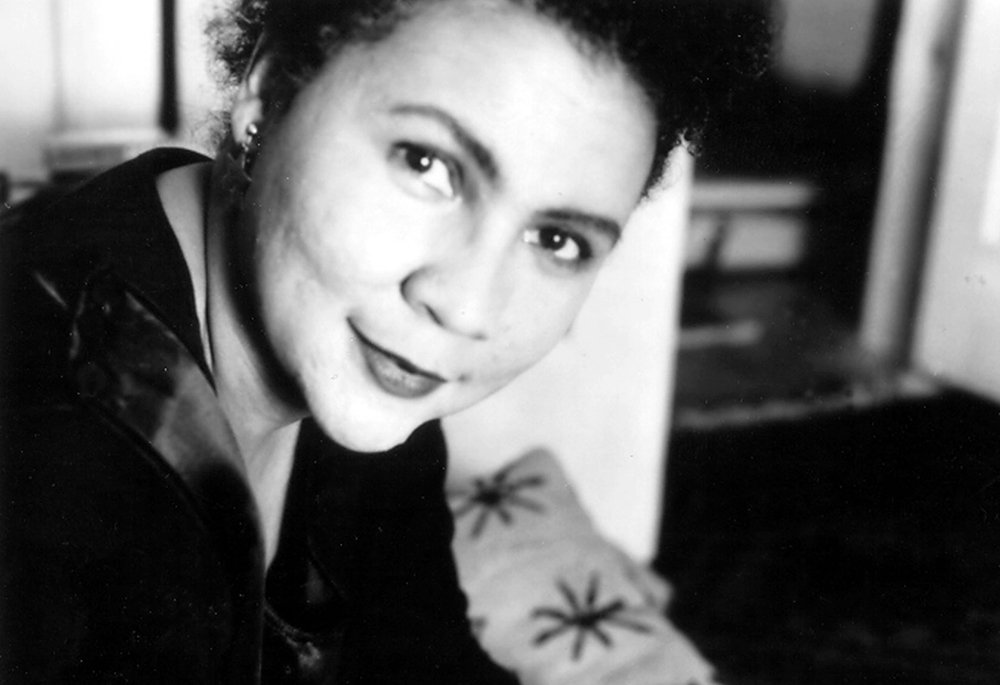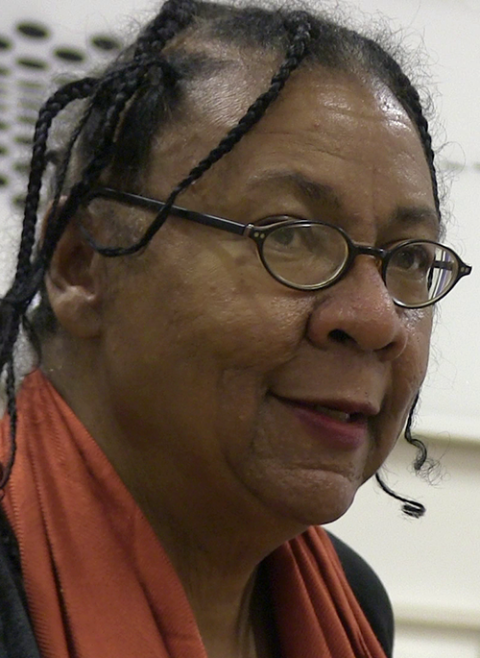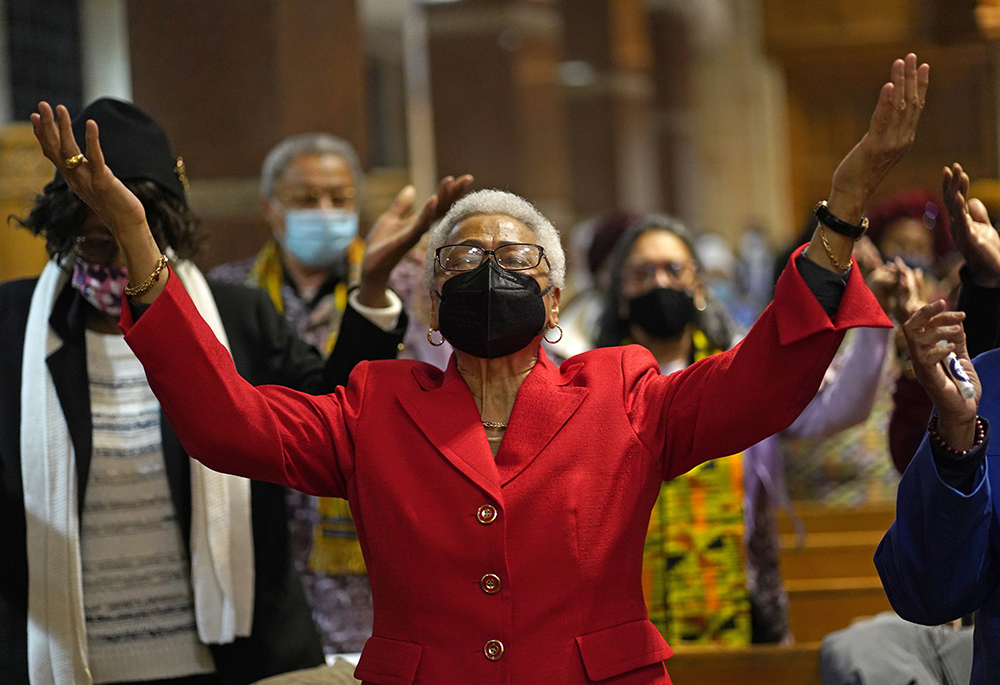
Author and social activist bell hooks (Newscom/KRT/Donna Dietrich)
One of our nation's leading public intellectuals, Black feminist author and social activist bell hooks has inspired many generations of academics and non-academics alike, due not only to her commitment of creating and producing pedagogy rooted in anti-racist and anti-patriarchal practices, but her down-to-earth "anyone-can-do-it-too" approach to the work of social justice.
hooks died in 2021 at the age of 69, an immense loss for both the African American community and those who knew her personally and were deeply impacted by her life's work.
And for so many Black Catholics, who have fought time and again to be visible to a church that has continually benefited from our marginality and status as "other," hooks' liberating praxes rooted in the intersectional concerns of race, class and gender inequalities continue to inspire those with their own charisms of teaching, preaching, healing, and prophetic witness to use their vocations as clergy, laity, and theological educators to further transgress systems of oppression.
"bell hooks' teachings have impacted me as a Black Catholic woman by helping me to understand and embrace a freer, more expansive, and intentionally intersectional embodiment of my identities," said Sydney Curtis, a doctoral candidate in higher education at Loyola University Chicago. "Because of her intersectional feminism, hooks taught me how to name and embrace myself as an 'outsider within' institutions like academia and the church. Her work helps me to understand that a person who occupies these spaces and benefits from proximity to their power and privilege, as we do as Catholics in a Christian-dominated society, can also hold the responsibility for critiquing and demanding their transformation to be more just and inclusive."

bell hooks in 2014 (Wikimedia Commons/Alex Lozupone (Tduk), CC BY-SA 4.0)
hooks' work as a writer and social activist primarily focused on feminism and its interconnectivity to issues of race, gender and capitalism, as well as how these elements continue to influence, shape and structure systems of oppression and inequality. As Clay Risen wrote in The New York Times, hooks "argued that feminism's claim to speak for all women had pushed the unique experiences of working-class and Black women to the margins."
Diana L. Hayes, emerita professor of systematic theology at Georgetown University, said that hooks' works helped Black women find a place for themselves in academia and society. Hayes first met hooks in the 1990s and although the two shared similar interests, they disagreed on one major thing.
"As a black feminist, hooks saw no need for the emergence of a term that was specifically for Black women, womanist," Hayes said. "Like many black feminists, she saw feminism as sufficient for describing the roles, meanings, and understandings of Black women. I disagreed then and now. I believe this was also because, in its earliest beginnings, womanism was a term coined by Black female theologians who were interested in exploring their roles and responses as well as their contributions to the study of theology. …We basically agreed to disagree, not allowing the issue to deny our friendship."
While still an undergraduate at Stanford University, hooks began writing her seminal 1981 classic Ain't I a Woman: Black Women and Feminism, which explored racism on Black women, media roles and portrayals, the degradation of Black women, the impact of sexism from historical perspectives, the education system, and the disregard for issues of race and class within feminism and a white-supremacist-capitalist patriarchy. For hooks, the devaluation of Black womanhood occurred "as a result of the sexual exploitation of Black women during slavery that has not altered in the course of hundreds of years."
"When I was in my thirties and teaching theology at my religious community's sponsored high school, I co-moderated the students' Afro Club and I immersed myself in all kinds of issues related to race and racism," said Notre Dame Sr. LaReine-Marie Mosely, professor of religious studies at St. Mary's University. "At times, I found myself overwhelmed and physically exhausted. bell hooks came to my rescue. I delved into her book, Sisters of the Yam: Black Women and Self-Recovery where I learned about my need for self-care. I had come up against the challenges of working for racial justice like so many had done before me. I wanted action and wanted it yesterday. hooks taught me that Black folks 'come from a long line of ancestors who knew how to heal the wounded black psyche when it was assaulted by white supremacist beliefs.' "
Advertisement
However, hooks' work did not only focus on the plight of Black women but all peoples. Her book Feminism is for Everybody (2000) and later essays and books on masculinity including We Real Cool: Black Men and Masculinity (2004) demonstrated that much of the work of anti-Black racism, while rooted in patriarchal worldviews that excluded the experiences of Black women, was also the direct result of centuries of oppression and exclusion of Black men.
"I have been deeply influenced by bell hooks' claim that 'feminism is for everybody,' " said Andrew L. Prevot, associate professor of systematic theology at Boston College. "This is the title of a book she first published in 2000, and it is also a challenge to anyone who might act as though the struggle to end patriarchal oppression is optional for them or something they can support from a distance. This is a temptation for male theologians, including Black male theologians such as myself — but the great Black feminist author bell hooks holds me and all of us accountable. She has helped me understand the close relationship between sexism, racism, and other systems of domination."
"bell hooks challenged me to raise my consciousness about how patriarchy affects me as a man," added Byron Wratee, a doctoral candidate in systematic theology at Boston College. "She taught me that patriarchy oppresses everyone. bell hooks was the first person to help me see the connection between war and patriarchy. She was the first to help me understand how young men and boys are the largest victims of war making and warmongering. She had a deep concern for the spiritual and psychological well-being of young boys that made me question my own solidarity with other young men and boys across the world who are indoctrinated into toxic masculinity for the sake of patriarchy."
In a 2015 interview with The New York Times, hooks said that the main goal throughout her career has been to "produce theory that people could use."

A woman prays during a Black History Month Mass of thanksgiving at Immaculate Conception Church in the Jamaica Estates section of the New York borough of Queens Feb. 20. (CNS/Gregory A. Shemitz)
"I have this phrase that I use, 'working with the work,' " hooks said. "So if somebody comes up to me, and they have one of those bell hooks books that's abused and battered, and every page is underlined, I know they've been working with the work. And that's where it is for me."
In another interview with Bomb Magazine, hooks notes that it is crucial to think of writing as a form of activism, asserting "what does it matter if we write eloquently about decolonization if it's just white privileged kids reading our eloquent theory about it? Masses of black people suffer from internalized racism, our intellectual work will never impact on their lives if we do not move it out of the academy. That's why I think mass media is so important."
In the Times interview, hooks comments that her life's work sought to demonstrate that the only way out of systems of marginalization is love: "I believe wholeheartedly that the only way out of domination is love, and the only way into really being able to connect with others, and to know how to be, is to be participating in every aspect of your life as a sacrament of love."
Those who are familiar with the work of Alice Walker may remember her assertion in the literary collection In Search of Our Mothers' Gardens: Womanist Prose that a womanist is a "black feminist or feminist of color" who is "committed to [the] survival and wholeness of entire people, male and female." More importantly, she is a lover of music, dance, food and roundness; a lover of struggle, the Spirit, the folk and herself. Regardless.
hooks, together with her work, embodied these principles and taught us, quoting M. Scott Peck, that "love is as love does … [it] is an act of [the] will — namely, both an intention and action." Like our Catholic faith, bell's philosophy on love is that it is a gracious gift given to humanity to be used in nurturing not only ours but another's spiritual growth. Love and abuse therefore cannot coexist; true love is never devoid of justice.
The legacy of bell hooks' life is that genuine faith gives birth to works: works of advocacy, of dismantling systems of power, of undoing internalized self-hatred, and eliminating hierarchies that seek to kill, divide and destroy. hooks understood action, along with love, as a sacrament — "[a] visible form of an invisible spirit, an outward manifestation of an inward power." She believed that spirituality and the spiritual life were the centers out of which we gather the strength to love and in turn, empower one to protest and resist.
For her, a commitment to the spiritual life required more than reading books; it demands conscious effort where we are willing to unite the ways we think with the ways we act. Only then can we embrace love as our true destiny.







